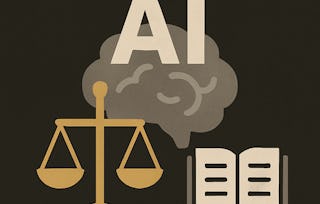Computing systems and technologies fundamentally impact the lives of most people in the world, including how we communicate, get information, socialize, and receive healthcare. This course is the third of a three course sequence that examines ethical issues in the design and implementation of computing systems and technologies, and reflects upon the broad implication of computing on our society. It covers medical applications, uses of robotics, autonomous vehicles, and the future of work.

Ethical Issues in Computing Applications

Ethical Issues in Computing Applications
This course is part of Computing, Ethics, and Society Specialization

Instructor: Bobby Schnabel
Included with
Recommended experience
What you'll learn
Identify and manage ethical situations that may arise in you career.
Analyze the ethical issues that are arising in key applications of technology, and even deeper issues that may arise as these technologies evolve.
Become aware of and sensitive to issues with how the rapid progress of technology is influencing the jobs available to everyone in our society.
Skills you'll gain
Details to know

Add to your LinkedIn profile
5 assignments
See how employees at top companies are mastering in-demand skills

Build your subject-matter expertise
- Learn new concepts from industry experts
- Gain a foundational understanding of a subject or tool
- Develop job-relevant skills with hands-on projects
- Earn a shareable career certificate

There are 5 modules in this course
In this introductory week, you will delve into the fascinating world of computing, ethics, and society. You will explore the fundamental concepts of ethics and ethical frameworks, providing a solid foundation for the entire course. You will gain insights into key ethical theories, including Kantianism, Virtue Ethics, Utilitarianism, and Social Contract Theory. Through interactive discussions and engaging resources, you will understand how these theories shape our moral decision-making processes and their significance in the context of computing technologies.
What's included
5 videos13 readings2 assignments
This week is dedicated to the ethical considerations in the intersection of technology and healthcare. Throughout this week, you will explore the complex ethical landscape of computing applications in medical contexts, delving into the ethical dilemmas arising from gene editing technologies such as CRISPR; the ethical dimensions of medical data, investigating issues of privacy, consent, and security in healthcare information systems, and the challenges posed by neural implants, contemplating the boundaries of human augmentation and the preservation of individual autonomy in the age of technological integration with the human body.
What's included
6 videos7 readings1 assignment1 peer review2 discussion prompts
This week you'll focus on the ethical considerations of robotics across diverse domains. You'll begin the week by examining robotics in healthcare, uncovering the potential benefits and challenges that arise when technology meets medicine. Then,. you'll shift focus to the ethically complex terrain of robotics in warfare, scrutinizing the implications of autonomous machines in armed conflicts. Finally, you will explore the use of robotics in policing, where we'll discuss the evolving roles of machines in law enforcement and the ethical questions they raise.
What's included
6 videos5 readings1 assignment1 peer review1 discussion prompt
This week will explore he fascinating realm of autonomous vehicles, where you will unravel the intricate ethical and safety considerations surrounding self-driving cars. You will analyze the arguments both for and against the widespread adoption of autonomous vehicles, dissecting the potential benefits and challenges they present to society. Finally, you will also assess the various risks inherent in the use of self-driving cars, considering issues of safety, liability, and the impact on urban landscapes.
What's included
4 videos4 readings1 assignment1 peer review2 discussion prompts
In this final week, you will look explore and discuss the future of artificial intelligence. Throughout the week, you will explore the evolving landscape of employment as AI technologies continue to advance, and the potential trajectories of AI in the workplace, contemplating the roles it may play in augmenting human labor, automating tasks, and transforming industries. You will closely examine the profound implications of AI on both workers and employers, exploring how these technologies may reshape job roles, workforce dynamics, and the broader job market.
What's included
7 videos5 readings1 peer review1 discussion prompt
Earn a career certificate
Add this credential to your LinkedIn profile, resume, or CV. Share it on social media and in your performance review.
Build toward a degree
This course is part of the following degree program(s) offered by University of Colorado Boulder. If you are admitted and enroll, your completed coursework may count toward your degree learning and your progress can transfer with you.¹
Instructor

Offered by
Explore more from Algorithms
 Status: Free Trial
Status: Free TrialUniversity of Colorado Boulder
 Status: Free Trial
Status: Free TrialUniversity of Colorado Boulder
 Status: Free Trial
Status: Free TrialUniversity of Colorado Boulder
 Status: Preview
Status: PreviewUniversity of Colorado Boulder
Why people choose Coursera for their career

Felipe M.

Jennifer J.

Larry W.

Chaitanya A.

Open new doors with Coursera Plus
Unlimited access to 10,000+ world-class courses, hands-on projects, and job-ready certificate programs - all included in your subscription
Advance your career with an online degree
Earn a degree from world-class universities - 100% online
Join over 3,400 global companies that choose Coursera for Business
Upskill your employees to excel in the digital economy
Frequently asked questions
To access the course materials, assignments and to earn a Certificate, you will need to purchase the Certificate experience when you enroll in a course. You can try a Free Trial instead, or apply for Financial Aid. The course may offer 'Full Course, No Certificate' instead. This option lets you see all course materials, submit required assessments, and get a final grade. This also means that you will not be able to purchase a Certificate experience.
When you enroll in the course, you get access to all of the courses in the Specialization, and you earn a certificate when you complete the work. Your electronic Certificate will be added to your Accomplishments page - from there, you can print your Certificate or add it to your LinkedIn profile.
Yes. In select learning programs, you can apply for financial aid or a scholarship if you can’t afford the enrollment fee. If fin aid or scholarship is available for your learning program selection, you’ll find a link to apply on the description page.
More questions
Financial aid available,

